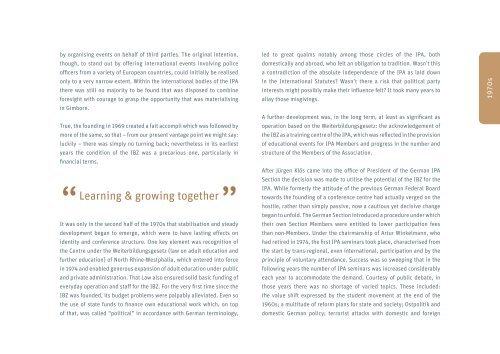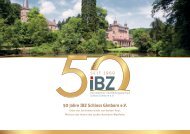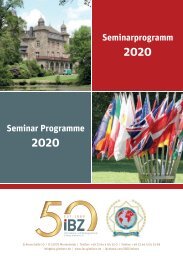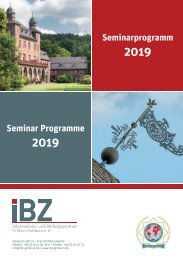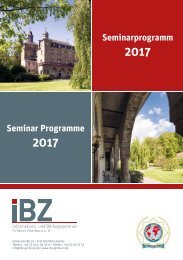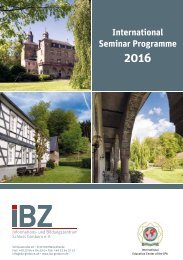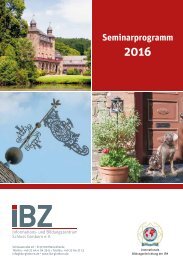50 Years IBZ Gimborn
You also want an ePaper? Increase the reach of your titles
YUMPU automatically turns print PDFs into web optimized ePapers that Google loves.
y organising events on behalf of third parties. The original intention,<br />
though, to stand out by offering international events involving police<br />
officers from a variety of European countries, could initially be realised<br />
only to a very narrow extent. Within the international bodies of the IPA<br />
there was still no majority to be found that was disposed to combine<br />
foresight with courage to grasp the opportunity that was materialising<br />
in <strong>Gimborn</strong>.<br />
True, the founding in 1969 created a fait accompli which was followed by<br />
more of the same, so that – from our present vantage point we might say:<br />
luckily – there was simply no turning back; nevertheless in its earliest<br />
years the condition of the <strong>IBZ</strong> was a precarious one, particularly in<br />
financial terms.<br />
“ „<br />
Learning & growing together<br />
It was only in the second half of the 1970s that stabilisation and steady<br />
development began to emerge, which were to have lasting effects on<br />
identity and conference structure. One key element was recognition of<br />
the Centre under the Weiterbildungsgesetz (law on adult education and<br />
further education) of North Rhine-Westphalia, which entered into force<br />
in 1974 and enabled generous expansion of adult education under public<br />
and private administration. That Law also ensured solid basic funding of<br />
everyday operation and staff for the <strong>IBZ</strong>. For the very first time since the<br />
<strong>IBZ</strong> was founded, its budget problems were palpably alleviated. Even so<br />
the use of state funds to finance own educational work which, on top<br />
of that, was called “political” in accordance with German terminology,<br />
led to great qualms notably among those circles of the IPA, both<br />
domestically and abroad, who felt an obligation to tradition. Wasn’t this<br />
a contradiction of the absolute independence of the IPA as laid down<br />
in the International Statutes? Wasn’t there a risk that political party<br />
interests might possibly make their influence felt? It took many years to<br />
allay those misgivings.<br />
A further development was, in the long term, at least as significant as<br />
operation based on the Weiterbildungsgesetz: the acknowledgement of<br />
the <strong>IBZ</strong> as a training centre of the IPA, which was reflected in the provision<br />
of educational events for IPA Members and progress in the number and<br />
structure of the Members of the Association.<br />
After Jürgen Klös came into the office of President of the German IPA<br />
Section the decision was made to utilise the potential of the <strong>IBZ</strong> for the<br />
IPA. While formerly the attitude of the previous German Federal Board<br />
towards the founding of a conference centre had actually verged on the<br />
hostile, rather than simply passive, now a cautious yet decisive change<br />
began to unfold. The German Section introduced a procedure under which<br />
their own Section Members were entitled to lower participation fees<br />
than non-Members. Under the chairmanship of Artur Winkelmann, who<br />
had retired in 1974, the first IPA seminars took place, characterised from<br />
the start by trans-regional, even international, participation and by the<br />
principle of voluntary attendance. Success was so sweeping that in the<br />
following years the number of IPA seminars was increased considerably<br />
each year to accommodate the demand. Courtesy of public debate, in<br />
those years there was no shortage of varied topics. These included:<br />
the value shift expressed by the student movement at the end of the<br />
1960s; a multitude of reform plans for state and society; Ostpolitik and<br />
domestic German policy; terrorist attacks with domestic and foreign<br />
1970s


